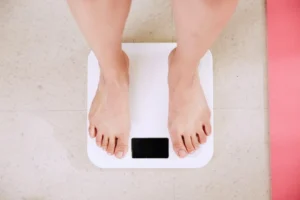
How to lose weight after pregnancy
Losing weight after pregnancy is a common concern for many new mothers. The process of giving birth and the postpartum period can lead to changes in a woman’s body, making it difficult to shed the extra weight gained during pregnancy.
Wondering how to shed those extra pounds after pregnancy? You’re not alone. Losing weight after childbirth can be challenging, but with the right approach, it’s possible to regain your pre-pregnancy shape and feel your best. Focus on balanced nutrition, gentle exercises, and practical lifestyle changes tailored for new moms. Discover effective strategies to lose weight after pregnancy and embrace a healthier, more energetic you. Here are some tried-and-true tips to help you on your journey!
Table of Contents
Understanding the Importance of Losing Weight after Pregnancy

Losing weight after pregnancy is not just about looking good, but it’s also important for your health. Excess weight gain during pregnancy can increase the risk of developing health issues such as high blood pressure, diabetes, and heart disease.
Here’s a table summarizing the importance of weight management during pregnancy:
| Importance | Description |
|---|---|
| Reduced Risk of Complications | Maintaining a healthy weight reduces the risk of pregnancy complications such as gestational diabetes, preeclampsia, and preterm birth. |
| Healthy Baby Development | Proper weight management ensures the baby receives adequate nutrients for healthy growth and development. |
| Easier Labor and Delivery | A healthy weight can lead to a smoother labor and delivery process, reducing the likelihood of cesarean sections. |
| Improved Postpartum Recovery | Managing weight during pregnancy can lead to a quicker and easier postpartum recovery |
Additionally, losing weight after pregnancy can improve your energy levels, boost your mood, and help you feel more confident in your body.
Understanding Your Body’s Needs

It’s crucial to have a deep understanding of your body’s needs during the postpartum period. Every woman’s experience is different, and factors such as breastfeeding, hormonal changes, and sleep deprivation can impact your weight loss journey. Consulting with your healthcare provider can provide valuable insights into your specific circumstances and help tailor your weight loss plan accordingly.
How to Lose Weight After Pregnancy?

Start with a Healthy Diet
The key to losing weight after pregnancy is to eat a healthy and balanced diet while incorporating exercise into your daily routine. A diet rich in fruits, vegetables, lean protein, and whole grains can help you shed the extra pounds while providing your body with the nutrients it needs to heal after giving birth. It’s important to focus on nourishing your body rather than restricting calories.
Here’s a sample meal plan to provide you with an idea of how to structure your meals while aiming for weight loss after pregnancy. Remember that individual dietary needs and preferences may vary, so feel free to adjust the plan to suit your specific requirements.
Breakfast:
- Vegetable omelet made with 2-3 egg whites and a variety of chopped vegetables such as spinach, bell peppers, and mushrooms.
- 1 slice of whole grain toast.
- 1 small serving of mixed berries.
- 1 cup of herbal tea or water.
Mid-Morning Snack:
- Greek yogurt topped with a handful of mixed nuts and a drizzle of honey.
- 1 piece of fruit (e.g., apple, pear, or orange).
Lunch:
- Grilled chicken or baked salmon with a side of roasted vegetables (such as broccoli, carrots, and cauliflower).
- 1/2 cup of quinoa or brown rice.
- Green salad with mixed greens, cherry tomatoes, cucumbers, and a light vinaigrette dressing.
- 1 cup of unsweetened herbal tea or water.
Afternoon Snack:
- Hummus with carrot sticks, cucumber slices, and whole grain crackers.
- 1 small handful of almonds or other nuts.
Dinner:
- Grilled lean protein (chicken breast, turkey breast, or tofu) with a side of steamed vegetables (such as asparagus, Brussels sprouts, and zucchini).
- 1/2 cup of sweet potatoes or quinoa.
- Spinach or kale salad with cherry tomatoes, feta cheese, and a lemon vinaigrette dressing.
- 1 cup of unsweetened herbal tea or water.
Evening Snack:
- 1 small serving of low-fat cottage cheese or Greek yogurt with a drizzle of honey and sliced fruits.
- Herbal tea or water.
Remember to listen to your body’s hunger and fullness cues and adjust portion sizes accordingly. It’s also essential to stay hydrated throughout the day by drinking water regularly. This sample meal plan emphasizes whole foods, lean proteins, fiber-rich carbohydrates, and healthy fats, providing essential nutrients while supporting weight loss. Feel free to incorporate other healthy food choices and adapt the meal plan based on your dietary preferences and any specific nutritional needs or restrictions you may have. Consulting with a registered dietitian can provide personalized guidance and help tailor a meal plan to your specific requirements.
Staying Hydrated and Limiting Sugary Beverages

Drinking an adequate amount of water is essential for overall health and can aid in weight loss. Hydration supports your body’s natural processes and can help curb unnecessary snacking or overeating. Keep a water bottle handy and make it a habit to sip throughout the day.
Here’s a table summarizing the benefits of staying hydrated:
| Benefit | Description |
|---|---|
| Improves Physical Performance | Proper hydration enhances muscle function and endurance, reducing fatigue during physical activities. |
| Boosts Mental Clarity | Staying hydrated supports cognitive function, improving focus, concentration, and memory. |
| Aids Digestion | Water helps break down food and absorb nutrients, promoting efficient digestion and preventing constipation. |
| Regulates Body Temperature | Hydration helps maintain a stable body temperature through sweating and respiration. |
| Promotes Skin Health | Adequate water intake keeps skin hydrated, reducing dryness and promoting a healthy complexion. |
| Supports Kidney Function | Water helps flush out toxins and waste products, reducing the risk of kidney stones and infections. |
| Reduces Headaches | Proper hydration can prevent and relieve headaches caused by dehydration. |
| Maintains Cardiovascular Health | Water ensures blood volume and circulation, supporting heart health and regulating blood pressure. |
| Enhances Joint and Muscle Health | Hydration keeps joints lubricated and muscles functioning properly, reducing the risk of cramps and injuries. |
| Boosts Immune System | Staying hydrated supports the immune system by maintaining the balance of bodily fluids and aiding in the elimination of toxins. |
Ensuring adequate hydration is crucial for overall health and well-being. By maintaining proper hydration, you can support various bodily functions and improve your physical and mental performance.
Avoid sugary beverages such as soda, juice, or energy drinks, as they are high in empty calories and can hinder your weight loss efforts. Opt for water, herbal teas, or infused water with fruits and herbs for flavor.
Adopt an Exercise Routine

When it comes to exercise, it’s important to start slowly and gradually increase the intensity and duration of your workouts as your body recovers. Walking, yoga, and swimming are great low-impact exercises to start with after giving birth. You can also consider joining a postnatal exercise class or working with a personal trainer who specializes in postpartum fitness. Remember to listen to your body and take breaks as needed.
Here are some exercises that can be beneficial:

- Walking: Walking is a low-impact exercise that can be easily incorporated into your daily routine. Start with shorter walks and gradually increase the distance and pace as you feel more comfortable. Aim for at least 30 minutes of brisk walking most days of the week.
- Postpartum Pilates: Pilates is a gentle yet effective form of exercise that focuses on strengthening the core muscles, improving posture, and enhancing overall body strength. Look for postpartum-specific Pilates classes or videos that target the abdominal and pelvic floor muscles, which can be weakened during pregnancy and childbirth.
- Yoga: Yoga is a great exercise option for postpartum weight loss as it helps improve flexibility, strength, and relaxation. Look for postpartum yoga classes or videos that focus on gentle movements and stretches specifically designed for new mothers.
- Swimming: Swimming is a low-impact exercise that provides a full-body workout. It’s gentle on the joints and can help increase cardiovascular fitness while toning muscles. If you have access to a pool, consider incorporating swimming or water aerobics into your exercise routine.
- Mommy and Baby Workouts: Many fitness centers and online platforms offer mommy and baby workout classes. These classes allow you to exercise while bonding with your baby. They often include exercises that incorporate your baby’s weight or involve using a stroller for added resistance.
Remember to listen to your body and give yourself enough time to recover after giving birth. It’s important to consult with your healthcare provider before starting any exercise routine, especially if you had a complicated delivery or if you have any specific health concerns.
Don’t Rush into Weight Loss

It’s important to remember that losing weight after pregnancy takes time, and rushing into weight loss can do more harm than good. Your body needs time to recover after giving birth, so it’s best to wait at least six weeks before starting a weight loss program. During this time, focus on eating a healthy diet and getting enough rest. Breastfeeding can also help you lose weight naturally while providing your baby with the essential nutrients they need.
“Without health life is not life; it is only a state of langour and suffering – an image of death.” – Buddha
Additionally, it’s important to have realistic expectations and set achievable goals. Your body has gone through significant changes during pregnancy, and it may take several months or longer to reach your pre-pregnancy weight. Be patient with yourself and celebrate small victories along the way.
Get Enough Sleep and Rest

Getting enough sleep and rest is crucial when it comes to losing weight after pregnancy. Lack of sleep can lead to an increase in appetite and cravings for unhealthy foods, which can make weight loss more difficult. It’s important to prioritize rest and relaxation, especially during the postpartum period. Take naps when your baby is sleeping, ask for help with household chores, and make sure to carve out some time for yourself each day. Self-care is essential for your overall well-being and can contribute to successful weight loss.
Note: There might be affiliate links mentioned here. We may receive a commission if you purchase a product through an affiliate link. There is no additional charge for you. Please do your own research before making any online purchases.
Emotional Well-being

Managing stress and emotions is essential during the postpartum period, as they can influence your eating behaviors. Find healthy coping mechanisms such as practicing relaxation techniques, engaging in hobbies, seeking emotional support, or even seeking therapy if needed. Addressing emotional well-being is a crucial aspect of your weight loss journey and can contribute to long-term success.
Seek Support from Friends and Family

Losing weight after pregnancy can be challenging, so it’s important to seek support from friends and family. Talk to your partner, family members, or friends about your weight loss goals and ask for their support. Having a strong support system can provide encouragement and motivation when you need it the most. Joining a new mom’s group or finding an online community of other new moms can also be a great way to connect with others who are going through the same experience as you. Sharing your struggles and successes with others can make the journey feel less overwhelming.
Addressing Mental Health and Seeking Support

Postpartum depression and anxiety are common during the postpartum period and can impact your weight loss journey. It’s essential to prioritize your mental health and seek support if needed. Talk openly with your healthcare provider about any emotional or mental health concerns you may have. They can provide appropriate guidance and connect you with resources or support groups that specialize in postpartum mental health.
In addition to professional support, friends, family, and other new mothers who can provide encouragement and understanding, joining support groups or online communities can help you connect with others who are going through similar experiences and provide a sense of community and validation.
Consider Professional Help if Needed

If you’re struggling to lose weight after pregnancy, it may be time to consider professional help. A registered dietitian or a personal trainer with experience in postpartum weight loss can provide you with customized diet and exercise plans tailored to your specific needs and goals. They can help you create a realistic and sustainable plan that takes into account your lifestyle, dietary restrictions, and any underlying health conditions.
Additionally, postpartum depression can make weight loss more challenging, so it’s important to seek help if you’re struggling with your mental health. Talk to your healthcare provider if you’re experiencing symptoms of depression or anxiety. They can provide you with the necessary support and resources to address your mental health concerns, which can in turn positively impact your weight loss journey.
Breastfeeding and Weight Loss

If you are breastfeeding, it’s important to approach weight loss with caution and ensure that your baby’s nutritional needs are met. Breastfeeding burns extra calories, helping with weight loss, but it’s essential to maintain a balanced diet to support milk production and provide the necessary nutrients for both you and your baby. Avoid crash diets or extreme calorie restrictions, as they can negatively impact your milk supply and overall health.
Tracking Progress and Celebrating Milestones

Keeping track of your progress can help you stay motivated and provide a sense of accomplishment. Set realistic goals and regularly assess your progress. You can track your weight, measurements, or even non-scale victories such as increased energy levels or improved fitness performance. Celebrate each milestone along the way, whether it’s fitting into pre-pregnancy clothes or reaching a certain fitness goal.
Remember that the scale is not the only measure of success. Your body has gone through significant changes during pregnancy, and weight loss is just one aspect of your postpartum journey. Embrace the process, be patient, and focus on overall health and well-being rather than solely on the number on the scale.
Incorporating Self-Care and Time for Yourself

Taking care of yourself is essential during the postpartum period. Carve out time for self-care activities that you enjoy and help you relax and recharge. This can be as simple as taking a warm bath, reading a book, practicing meditation or mindfulness, or engaging in a hobby. Prioritize self-care without guilt, as it plays a vital role in your overall well-being and can positively impact your weight loss journey.
Remember, every woman’s weight loss journey after pregnancy is unique. Be kind to yourself, embrace your body’s changes, and focus on progress rather than perfection. Set realistic goals, make sustainable lifestyle changes, and seek support when needed. With time, patience, and dedication, you can achieve your weight loss goals and feel confident and healthy in your postpartum body.
Conclusion
Losing weight after pregnancy is a common concern for many new mothers. However, with a healthy diet, exercise, and adequate rest, losing weight after pregnancy can be achieved. It’s important to understand the importance of losing weight for your overall health and well-being. Starting with a healthy diet and exercise routine, and avoiding rushing into weight loss, are key factors in achieving sustainable results.
Additionally, getting enough sleep and rest, seeking support from friends and family, and considering professional help if needed are important aspects of the weight loss journey. Remember that each person’s journey is unique, and it’s important to be patient and kind to yourself throughout the process. With time, effort, and the right support, you can achieve your weight loss goals and feel confident and healthy in your postpartum body.
Disclaimer: The information provided in this article is for educational purposes only and should not be considered as a substitute for medical advice. Consult a healthcare professional before implementing any home remedies or making significant changes to your lifestyle.
FAQs
How soon can I start losing weight after pregnancy?
It’s best to wait until your postnatal check-up (usually around six weeks after birth) before starting any weight loss plan to ensure your body has healed.
What are some safe exercises to do after pregnancy?
Gentle activities like walking, pelvic floor exercises, and postpartum yoga are great for new moms. Gradually increase intensity as you recover.
How can I manage my diet for postpartum weight loss?
Focus on a balanced diet with plenty of fruits, vegetables, lean proteins, and whole grains. Stay hydrated and avoid skipping meals.
Is breastfeeding helpful for weight loss?
Yes, breastfeeding can help burn extra calories and aid in weight loss. However, it’s important to ensure you’re getting enough nutrients for both you and your baby.
What lifestyle changes can support weight loss after pregnancy?
Prioritize sleep, manage stress, and seek support from family or friends. Small, consistent changes can make a big difference in your postpartum weight loss journey.







